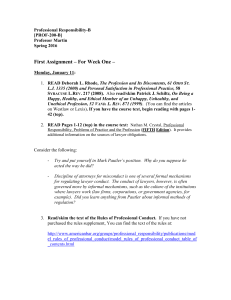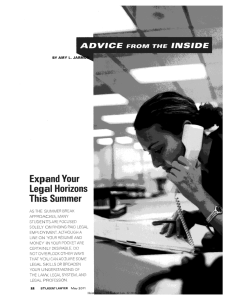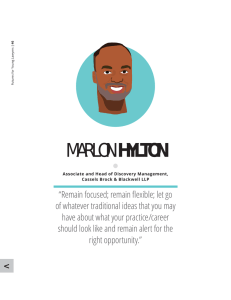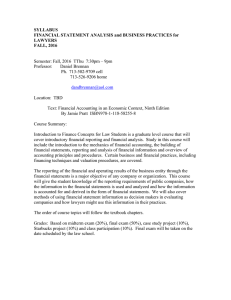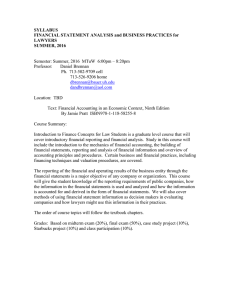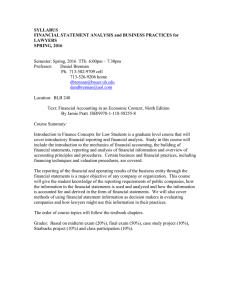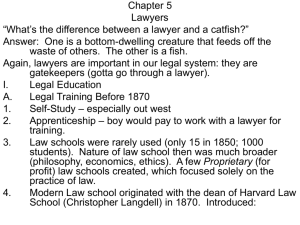Michael S. Greco Past President, American Bar Association Keynote Address
advertisement
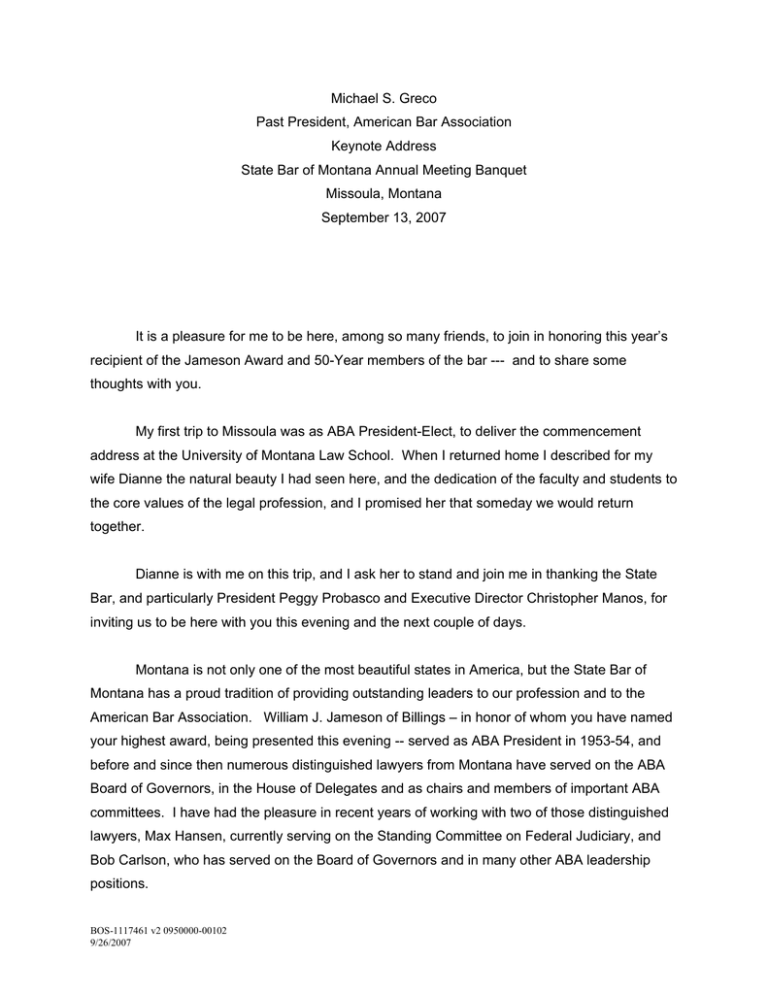
Michael S. Greco Past President, American Bar Association Keynote Address State Bar of Montana Annual Meeting Banquet Missoula, Montana September 13, 2007 It is a pleasure for me to be here, among so many friends, to join in honoring this year’s recipient of the Jameson Award and 50-Year members of the bar --- and to share some thoughts with you. My first trip to Missoula was as ABA President-Elect, to deliver the commencement address at the University of Montana Law School. When I returned home I described for my wife Dianne the natural beauty I had seen here, and the dedication of the faculty and students to the core values of the legal profession, and I promised her that someday we would return together. Dianne is with me on this trip, and I ask her to stand and join me in thanking the State Bar, and particularly President Peggy Probasco and Executive Director Christopher Manos, for inviting us to be here with you this evening and the next couple of days. Montana is not only one of the most beautiful states in America, but the State Bar of Montana has a proud tradition of providing outstanding leaders to our profession and to the American Bar Association. William J. Jameson of Billings – in honor of whom you have named your highest award, being presented this evening -- served as ABA President in 1953-54, and before and since then numerous distinguished lawyers from Montana have served on the ABA Board of Governors, in the House of Delegates and as chairs and members of important ABA committees. I have had the pleasure in recent years of working with two of those distinguished lawyers, Max Hansen, currently serving on the Standing Committee on Federal Judiciary, and Bob Carlson, who has served on the Board of Governors and in many other ABA leadership positions. BOS-1117461 v2 0950000-00102 9/26/2007 This evening I want to talk with you about the place that the lawyer occupies in society today. About the challenges and threats that now confront lawyers and the legal profession. And about what we must do vigorously to respond to those challenges and threats. I begin with the importance of an independent legal profession in America. In the past several years our profession has been under unprecedented attack, unlike anything I have seen in my thirty-five years as a lawyer. During the past six years federal government agencies have been adopting policies and regulations that, either inadvertently or intentionally, try to diminish and marginalize the role of the lawyer in society. Among many examples I point to the Sarbanes-Oxley Act and related regulations that impose on lawyers new obligations relating to client misconduct; the Gramm-Leach-Bliley Act pursuant to which the FTC mystifyingly (and unsuccessfully as a result of an ABA lawsuit) tried to regulate and discipline lawyers as “financial institutions”; and the Bankruptcy Reform Act of 2005, which makes lawyers liable for errors in a debtor-client’s asset schedules and also, astoundingly, limits the advice that a lawyer may give to bankruptcy clients. Another example, and a direct affront to the fundamental role that lawyers have in safeguarding the rights of all people, occurred a few months ago, when Charles Stimson, a US Defense Department official, outrageously suggested that corporations should punish law firms whose lawyers represent detainees at Guantanamo by withholding legal work from those firms. Lawyers must be able to represent unpopular clients and causes without fear of retribution. It has been so since the beginning of our republic – from the time that John Adams of Massachusetts, who went on to become the second US President, at great personal sacrifice represented despised British soldiers accused of killing colonial patriots during the Boston Massacre. Indeed, the Sixth Amendment guarantees the assistance of counsel when an individual’s liberty is at risk. But today there are those who apparently reject such American values, or have lost sight of them. Although Mr. Stimson resigned after the outrage that his remarks ignited, the episode revealed the disrespect that some in the federal government have regarding the core concepts 2 of our justice system and our democracy. These recent developments reflect a dangerous trend for the independence of our profession and for society itself. Perhaps the greatest challenge to the legal profession today – and yet another example of the assault on the lawyer’s role in society – is the ongoing federal government attack on the attorney-client privilege, which has been a bedrock principle of the common law system for more than 700 years. You and I know – but the public does not fully understand -- that the attorney-client privilege exists not for the benefit lawyers, but for the protection of clients and citizens. It protects the American people, and our very system of government. The attorney-client privilege allows a client confidentially to entrust to his or her lawyer potentially damaging information, so that the lawyer, fully informed, can effectively counsel the client on how best to comply with the law, for the client’s protection and the protection of society. Harm to the attorney-client privilege is harm to the relationship between attorney and client. And harm to the relationship between attorney and client is harm to the American people and to our system of government. The privilege has made our legal system function fairly and justly since the beginning of our country. Fairness and due process are – or until the past six years have been -- the hallmarks of America. Fairness and due process have defined our national character for us, and for the world. How is the attorney-client privilege under attack? The U.S. Department of Justice and the U.S. Sentencing Commission several years ago adopted a policy that encourages prosecutors to ask – many say coerce -- corporations and individuals to waive the attorney-client privilege and attorney work-product doctrine in order to obtain “cooperation credit” – and a promise of leniency in charging and sentencing decisions. The ABA firmly opposes the policy. The ABA Task Force on the Attorney-Client Privilege, largely unsuccessfully so far, has been negotiating with the Justice Department for more than three years to end this dangerous practice, one which impinges on both the Fifth and Sixth Amendments to the US Constitution, and which undercuts fundamental due process and fairness in our justice system. 3 In April 2006, as a result of the sustained efforts of the ABA and state and local bar associations across the country, and those of an extraordinary coalition of organizations that include the US Chamber of Commerce and the American Civil Liberties Union, the US Sentencing Commission unanimously and wisely removed its waiver policy from the Sentencing Guidelines. But the Justice Department has not budged from its position. During 2006 ABA Day in Washington I brought the situation to the attention of Sen. Arlen Specter, then Chair of the Senate Judiciary Committee, and to other Members of Congress. Chairman Specter agreed to schedule a hearing on the issue, and that hearing took place a year ago. Prior to the hearing a letter signed by about a dozen former US Attorneys General and others, most of them Republicans, including my law partner Dick Thornburg, also urged then Attorney General Alberto Gonzales to abandon the waiver policy. To no avail. Instead of heeding that good advice and recent unanimously-adopted ABA House of Delegates policies protecting the privilege, and the urging of that extraordinary coalition of organizations I just mentioned, the response of DOJ was to issue the “McNulty Memorandum.” That memorandum, which announced minor changes, reiterated DOJ’s forced waiver policy. Incredibly, the Justice Department today continues its policy of coercing waivers of the privilege and work product doctrine. The resignation two weeks ago of Attorney General Gonzales likely will not result in a change in the DOJ’s policy. What is to be done? The organized bar, and lawyers, and business people, and others, must continue to put pressure on the Department of Justice. And we must look to Congress and the Judiciary to protect this fundamental principle of the American justice system from attack by the Executive Branch. Why have I gone on at some length about the Administration’s attempts to eliminate or erode the attorney-client privilege? Because it is part of the dangerous trend that I and many others are greatly concerned about – an effort by the federal government to deny citizens constitutionally-protected rights by trying to diminish the fundamental role of the lawyer in society. Clients, now concerned that 4 confidential information they provide to their lawyers may be disclosed to the government, are no longer entrusting sensitive information to, or confiding in, their counsel, and many foolishly are choosing not to maintain complete business records. These clients in effect are being forced to go without the advice of legal counsel, which is guaranteed by the Sixth Amendment, and not maintaining the records that could help prove innocence. And lawyers are being prevented from effectively counseling clients on how they voluntarily can comply with criminal and other laws, to society’s detriment. This disturbing trend has been documented by numerous lawyers around the country and in hearings held by the ABA Task Force on the Attorney Client Privilege. If lawyers are no longer consulted by clients, if lawyers are removed from their timehonored role as independent and zealous advocates for clients, how long will it be until lawyers are irrelevant? How long until the fundamental and historic role of the lawyer as trusted counselor, problem solver, advocate for broader social causes, and defender of freedoms, disappears – to the great harm of society and the American people? Why do federal government regulators and powerful interest groups want to see such a greatly diminished role for lawyers, and for our courts? Because it is lawyers and judges who stand between the people and the misconduct, or abuses of power, of government officials and powerful interest groups. Because lawyers and judges protect the freedoms guaranteed by the Constitution from harm, such as that being done now by misguided governmental terrorism policies that are doing more to erode our cherished freedoms than any terrorist could achieve. In short, because lawyers and judges protect the Rule of Law. In one of the most misquoted of his plays, Shakespeare had it right in Henry VI, part 2, when he noted that the surest way to create chaos and unleash tyranny throughout the land is to begin by killing all the lawyers – the guardians of the Rule of Law. In 21st Century America it is a different kind of death to lawyers, and judges, that we must guard against – death by marginalization, death by diminishment, by containment and, ultimately, death by irrelevance. 5 Make no mistake -- attacks on the independence of the legal profession and judiciary are a direct assault on our justice system and democracy. All lawyers, indeed, all Americans, must vigorously oppose this insidious trend. John Adams, who I mentioned a moment ago, one of the Founders of our country who authored the Massachusetts Constitution on which the US Constitution was based – cautioned that survival of democracy depends on both an independent legal profession and an independent judiciary. In the past three years I have traveled to numerous countries abroad to speak about and help advance and protect the rule of law, especially in developing democracies. In my travels I have learned first-hand that attacks on lawyers and judges are happening in countries throughout the world. Why do I mention what’s happening in other countries? First, because, even though the attacks may take different forms in other countries, such attacks on and intimidation of judges and lawyers are commonplace in most nations of the world, including the United States. Second, because harm to the legal profession or judiciary in any country is harm to the legal profession and the judiciary in every country, including the US. Third, because harm to the people of any nation because of a failure of the rule of law due to a weakened legal profession and judiciary is harm to all people everywhere, and to humankind, of which we are all a part. That is why I have been urging leaders of the bar throughout the world to recognize the critically important role of an independent legal profession to maintaining the rule of law, and to think of ourselves as of one, united, profession throughout the world – not separate professions, not islands, but one profession. United, and helping each other, lawyers will be able to withstand governmental and other attacks on the rule of law, on the judiciary, and justice systems throughout the world. To that end, following an extraordinary meeting of some one hundred bar leaders that took place in Paris, France, that I attended in November of my year as ABA president, 6 organized bars throughout the world have been adopting a Statement of Core Principles of the Legal Profession that I authored at that meeting. The Statement of Core Principles states in language understandable by a lay person that the legal profession, throughout the world, in the interest of the public everywhere, is committed to these core principles: - An impartial and independent judiciary, without which the rule of law cannot exist; - An independent legal profession, without which the rule of law and freedom for all people cannot exist; - Access to justice for all peoples of the world, which is only possible with an independent judiciary and an independent legal profession. -And that these core principles shall not yield to any emergency of the moment. Since the Paris meeting in November 2005 numerous bar associations around the world have adopted the Statement of Core Principles. The ABA House of Delegates unanimously adopted the Statement in February 2006. State and local bars have also adopted it, and I hope that the State Bar of Montana will consider doing so. Protection and advancement of the rule of law is a responsibility that requires the constant vigilance and partnership among the ABA, state and local bars, and other professions and groups in society. Under the leadership of new ABA President William Neukom, with his magnificent World Justice Project presidential initiative, the ABA is undertaking a global effort to make protection and advancement of the rule of law the responsibility and priority of not just lawyers and judges, but of every profession, discipline, organization and group in societies throughout the world. I hope that Montana will be at the forefront of this effort. The judiciary in our country continues to be under attack from irresponsible ideologues, extremists, powerful interest groups and politicians who seek to undermine respect for the judiciary, for political or other purposes. Judges who are sworn to, and strive to, do justice are 7 attacked as “judicial activists,” an accusation leveled by ideologues on either the right or the left who disagree with a judge’s decision, even if the decision is based on the law and the facts. Irresponsible calls by elected officials for impeachment of judges for unpopular decisions, threats of judicial budget cuts and the withholding of judicial salary increases, for “wrong decisions” pose a serious danger to our republic. Equally dangerous are congressional attempts to strip jurisdiction from our courts to hear constitutional claims in controversial cases such as those involving writs of habeas corpus, the pledge of allegiance, religious expression, and the definition of marriage. We have seen astounding referendum initiatives such as the one defeated last year in South Dakota called Jail 4 Judges, which would have eliminated judicial immunity and subjected judges to removal for decisions that a special grand jury determined to be a violation of law. Here in Montana you had Constitutional Initiative 98 – which would have required recall of a judge “for any reason acknowledging electoral dissatisfaction with a justice or judge notwithstanding good faith attempts to perform the duties of the office.” State Bar President Bernie McCarthy correctly deemed CI-98 “ludicrous.” But we must not ignore its implications. While the initiative was kept off the ballot this time, the efforts of its sponsors reflect, at the least, ignorance, and, at worst, a mean-spirited intention to intimidate and punish judges for discharging their constitutional duties. Such measures pose a serious threat to the independence of the judiciary. The organized bar and all lawyers must counter these ideological and extremist attacks on the one branch of our government that truly protects the rights and freedoms of individuals. As our Founders warned, without an independent judiciary and independent legal profession, there is no democracy. What’s to be done? 8 The answer lies in part in the constant education of the American people about the constitutionally-mandated roles of the three branches of our government, particularly the judiciary, and about the separation of powers doctrine. I appointed the ABA Commission on Civic Education and the Separation of Powers after an ABA-sponsored survey conducted by Harris Interactive disclosed that nearly fifty percent of Americans are unable identify the three branches of government; or know the meaning of “separation of powers” or “checks and balances; or know what a judge’s basic duties and responsibilities are (some believe judges advise presidents or declare war). The ABA Commission, led by honorary co-chairs Supreme Court Justice Sandra Day O’Connor and my Princeton classmate former US Senator Bill Bradley, and working chair Robert Rawson of Cleveland, and comprised of distinguished educators and former members of all three branches of government, has worked hard for two years to urge school boards around the country to reinstate civic education in school curricula. Especially in these troubling times, the greatest danger to our freedoms and democratic way of life is an uninformed and confused public that does not know their constitutional rights, that does not know enough to fight for the principles that protect their freedoms, and that in ignorance allows government officials to take their constitutionally protected rights away. It is our responsibility as lawyers constantly to educate our fellow citizens, and to make them understand what’s at stake. If we do not protect our judges they will not be able to protect us. And if lawyers and judges do not protect our precious freedoms, who will? Another responsibility that you and I have as lawyers is to guarantee access to justice for all in America. Perhaps you know that 70-80% of the legal needs of poor persons in our country go unaddressed year after year? That more than forty million Americans qualify for federal legal aid because they are at the poverty level? And that the meager funding provided by Congress through the Legal Services Corporation provides legal help for only one million of those forty million poor Americans? 9 Do you think that those forty million Americans may feel justified in believing that society has forgotten them, that the justice system in America protects only people of means, and not them? To address this issue, I appointed the ABA Task Force on Access to Civil Justice. I asked a distinguished group of judges and lawyers to consider an idea whose time, I believe has come: a right to counsel on the civil side – what is being called a Civil Gideon -- for the poor and vulnerable in America, parallel to the right that now exists on the criminal side. In 1963 the Supreme Court in Gideon v. Wainwright held that indigents facing imprisonment, who cannot afford to hire a lawyer, are guaranteed by the Sixth Amendment the right to counsel paid by the state. But “imprisonment” can be by other than behind steel bars. In our country every day poor and vulnerable people are imprisoned by homelessness, serious health conditions, and poverty-related issues. I therefore asked ABA Task Force on Access to Civil Justice to consider whether we should finally recognize in the US a civil right to counsel for the poor in those adversary matters that threaten basic human needs. Such a right to civil counsel for poor persons may be considered “cutting edge” in the US – but it has been recognized for a century or longer in many civilized nations around the world. The Task Force Force’s recommendation that the ABA endorse such a right to counsel was adopted by an unprecedented unanimous vote of the ABA House of Delegates at the ABA Annual Meeting a year ago, and is now ABA policy. That historic vote puts the ABA on record, for the first time, in favor of a Civil Gideon. As a result, there is now great and growing activity in a number of states from coast to coast regarding implementation of a Civil Gideon. In a democracy all citizens – rich or poor – should have the assistance of counsel when custody of children is threatened; or loss of shelter is imminent; or to obtain legislativelymandated health benefits. In those areas, family, shelter and health, when a poor person in America is threatened with denial or loss of basic legal rights, that person should have counsel at his or her side to 10 help secure those rights. No one in America – the most bountiful land of hope and promise in the world – should be without counsel when those basic needs are threatened. No one. I hope that Montana will join the movement to implement a Civil Gideon throughout the United States. A proud tradition of our profession – one that helps make a reality of the great American promise of “equal justice for all,” is the pro bono and public service work of lawyers. In order to enable more lawyers throughout the US to perform more pro bono and public service work, I appointed the ABA Commission on a Renaissance of Idealism in the Legal Profession, led by honorary co-chairs Supreme Court Justice Ruth Bader Ginsburg and Theodore Sorensen, who served as special counsel to President John F. Kennedy when the Peace Corps was formed, and working chair Mark Agrast of the ABA Board of Governors. The Commission has considered ways to persuade decision-makers in all law offices, inhouse law departments and government offices to free up time of lawyers so that they can engage in the kinds of pro bono and public service work that has defined the legal profession for the past 200 years. Growing up in a small town in Illinois, I decided as a boy that I wanted to become a lawyer when I realized that it was lawyers who led town committees such as the School Board, the Planning Board, other town boards and committees, and public service organizations, and who unhesitatingly helped people young and old in need of legal services, regardless of their ability to pay. Those lawyers worked in Chicago law firms or local law offices during the day, but they also made time to fulfill the time-honored role of Lawyer as Public Citizen. Regrettably, today we don’t have enough lawyers performing public service and pro bono work in our communities. There are many different reasons– mostly economic – for this, but we must now do something about it. 11 We must reclaim that important role of lawyer as Public Citizen – for the personal fulfillment of each lawyer who engages in pro bono and public service, for the benefit of the American people, and for the betterment of our profession. That is what the ABA Commission on a Renaissance of Idealism in the Legal Profession has worked to accomplish. If you go to the ABA website, www.abanet.org, you will be able to access the many useful products of the Commission, including a pro bono Best Practices Guide, and a very inspirational videotape on what it means to be a lawyer featuring Justice Ginsburg, Ted Sorensen, former ABA President Dennis Archer, and a few words from me. Public service and pro bono work define the lawyer’s role in society. I ask you and your office to join the Renaissance of Idealism in our profession that is spreading across the country. As a leader in our profession and in your community, you have opportunities to stand up to injustices, and to defend the freedoms that the Constitution guarantees. Don’t turn your back on those opportunities, even if they place you in the center of controversy. Embrace them. The people look to lawyers to protect their freedoms. We cannot let them down. I conclude with this. Seventeen centuries before Christ, in the first written code of law, Hammurabi wrote that the purpose of the law is to protect the powerless from the powerful. Powerless people will come to you for help, for desperately needed legal help -- and many of them will not be able to pay for your services. Help those people. Protect them. That, after all, is the highest calling -- and the noblest purpose -- of the lawyer in society. Thank you for your kind attention. 12
